————————————————————————————————-
-
Types
of word combinations. Classifications of word-groups. -
Free
word groups. -
Phraseology
as a subsystem of language. -
A
phraseological unit. -
Distinction
between free word-groups and phraseological
units. -
Classification
of phraseological units. -
Sources
of phraseological units.
————————————————————————————————-
1. Types of word combinations. Classifications of word-groups
The
vocabulary of any language consists not only of words but also of
different word groups and expressions.
Words put together to form lexical units make phrases or word-groups.
A word-combination (word-group) is a combination of two or more
words organizes according to the norms of the language. There are
three types of word-groups: 1) free; 2) semi-free (устойчивые);
3) phraseological units.
They are
different structurally and semantically.
2. Free word groups
Free
word combinations
are structurally and semantically unstable, e.g. a
good man;
a
good and reliable man;
a better man,
a
good woman.
They are characterized by the following features:
-
They are
made up by the speaker; they are productive. -
Each word
in a free word combination realizes its own meaning. For example, in
the word-combination a
red rose,
to
write a letter,
extremely
dangerous,
each word has its own meaning, and the meaning of the whole phrase
is the sum of the meanings of its components. -
Substitution
is possible in them.
to walk
fast
to
walk
slowly to move fast
forward
to run
backward
to go
in
the park to drive
in
the forest to fly
Semi-free
or
Fixed
combinations
of
words are
structurally and semantically stable and the meaning is understood
from the meanings of the components. That means there is no
transference of meaning of these combinations, e.g. a
man of business;
a
man of letters
(писатель).
They stand midway between free word-combinations and phrasiological
units. They are characterized in the following way:
-
They are
fixed because they are not made up in speech but are used as
ready-made units. -
The
meaning of the whole can be inferred from the meanings of its
components. -
They are
transitional, semi-productive.
Examples:
soft
landing,
to
commit suicide,
good
luck,
black
coffee,
Merry
Christmas,
Good
afternoon.
3. Phraseology as a subsystem of language
Phraseology
is
a branch of lexicology which studies different types of fixed
expressions, which like words name various objects and phenomena.
They are not created by the speaker but exist in the language as
ready-made units. These word-groups are characterized by stability of
structure and transferred (перенос)
meaning (take
the bull by the horn
–действовать
решительно,
напрямик
= брать
быка
за
рога);
(to
burn one’s boats –
совершать
решительный
поступок,
бесповоротно
разрывая
с
прошлым
= сжечь
корабли);
(to
eat a bushel of salt with –
очень
долгое
время
общаясь,
хорошо
узнать
кого-либо
= съесть
пуд
соли).
Соседние файлы в предмете [НЕСОРТИРОВАННОЕ]
- #
- #
- #
- #
30.04.2022451 Кб2Учебник 213.docx
- #
- #
- #
- #
- #
- #
- #
- Размер: 58 Кб
- Количество слайдов: 27
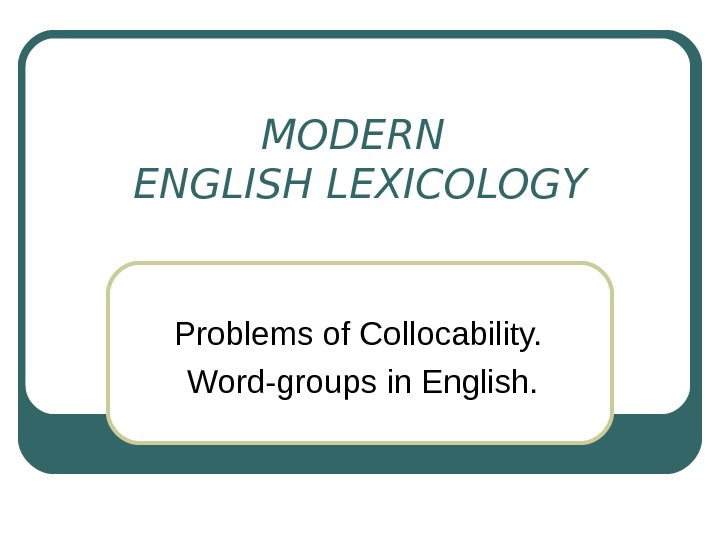
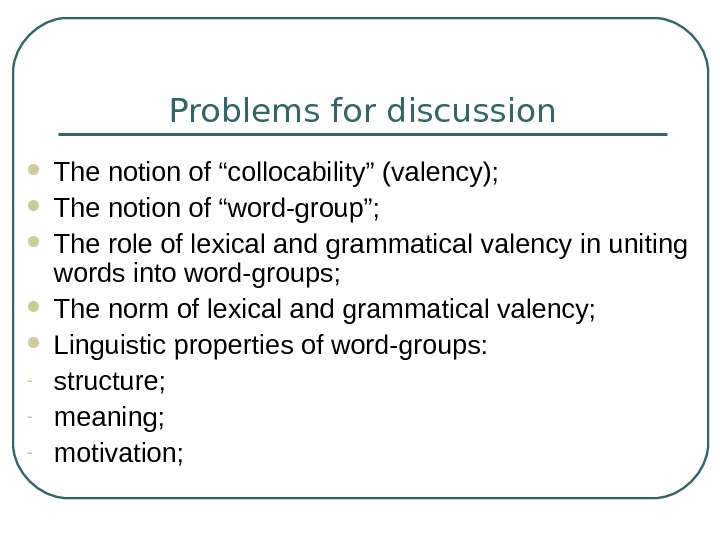
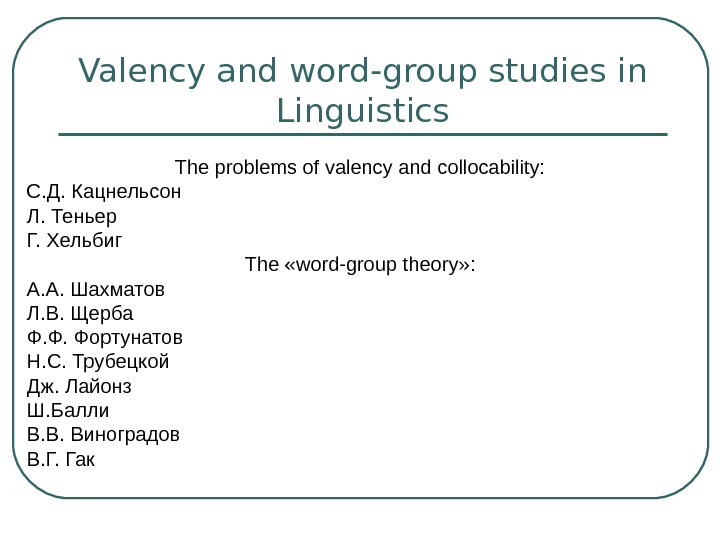
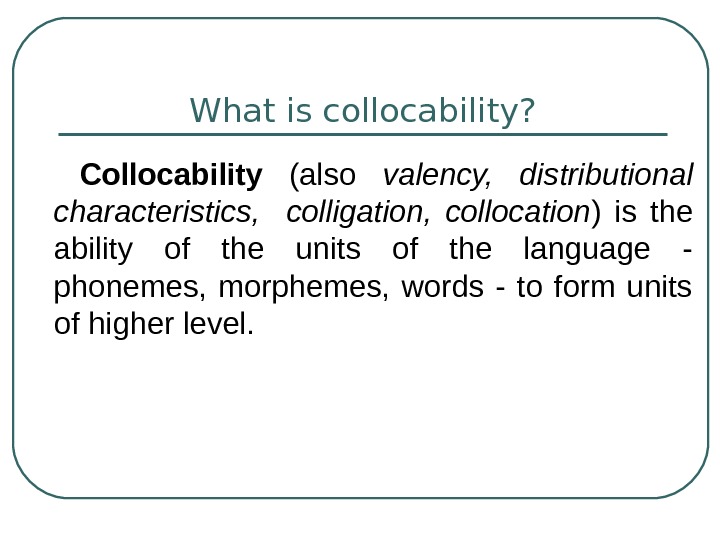
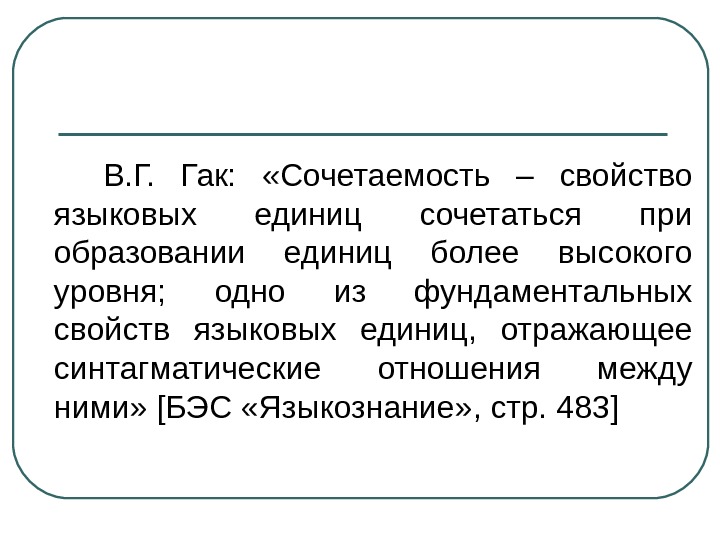

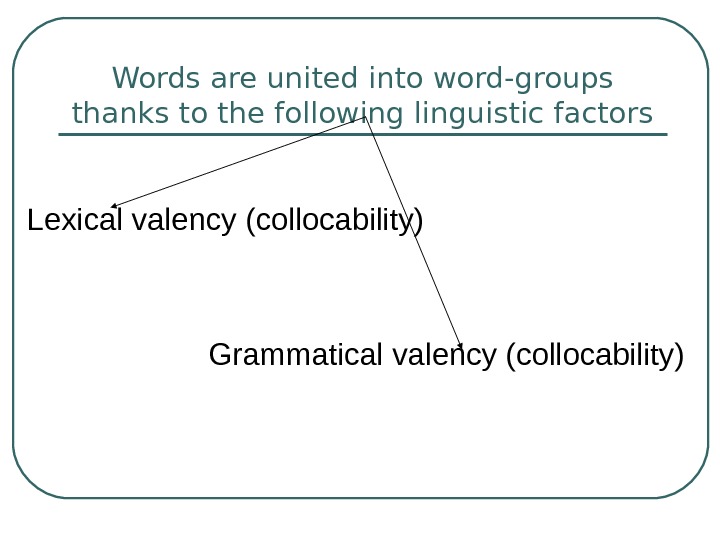
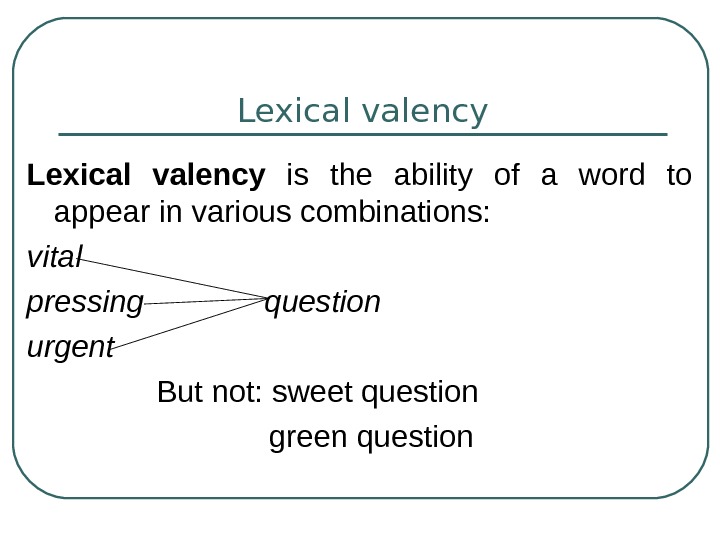
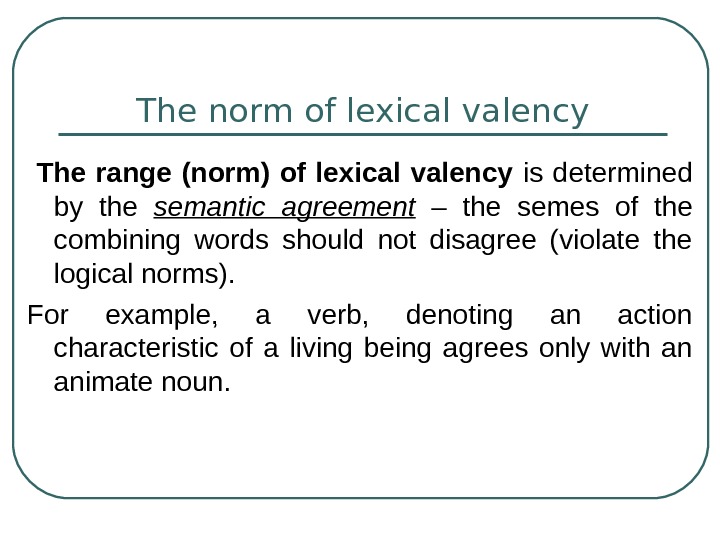
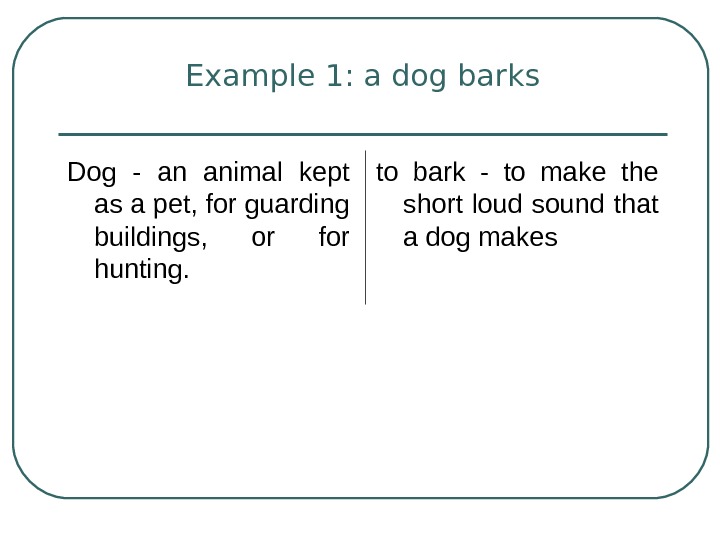
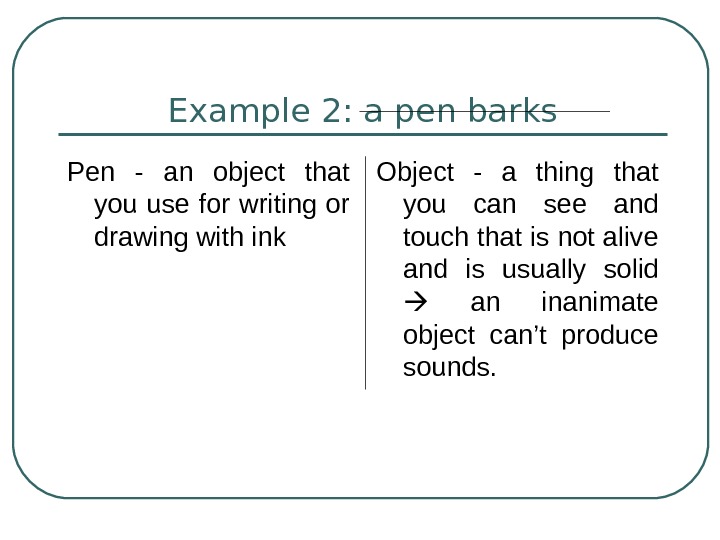
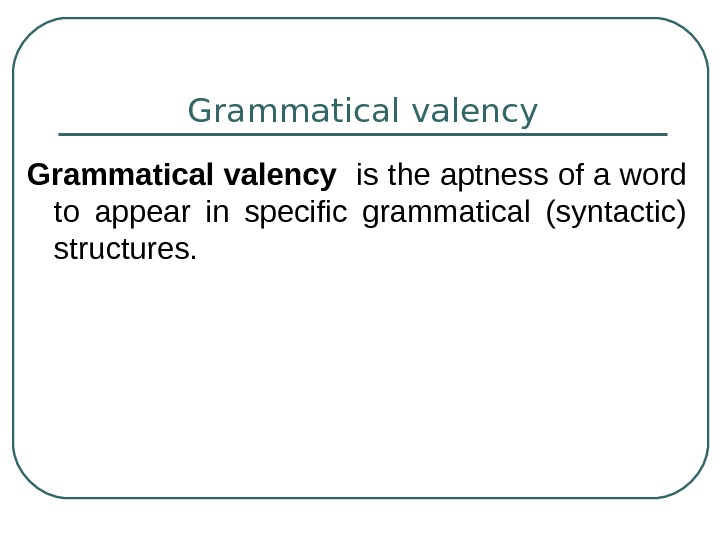
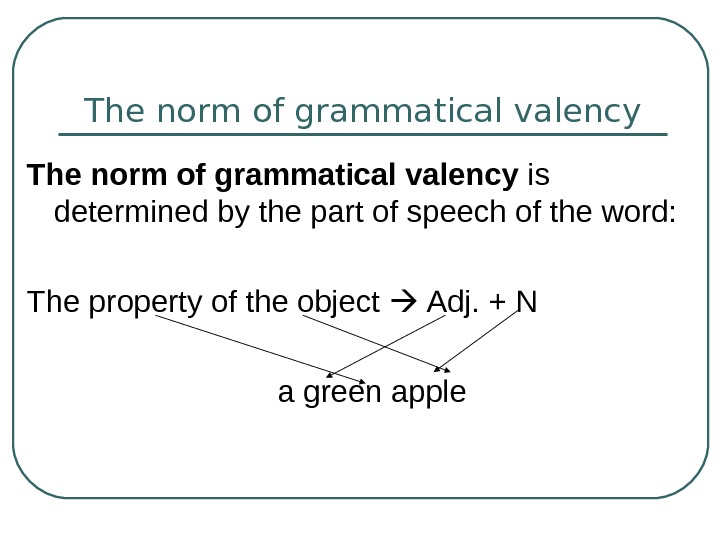
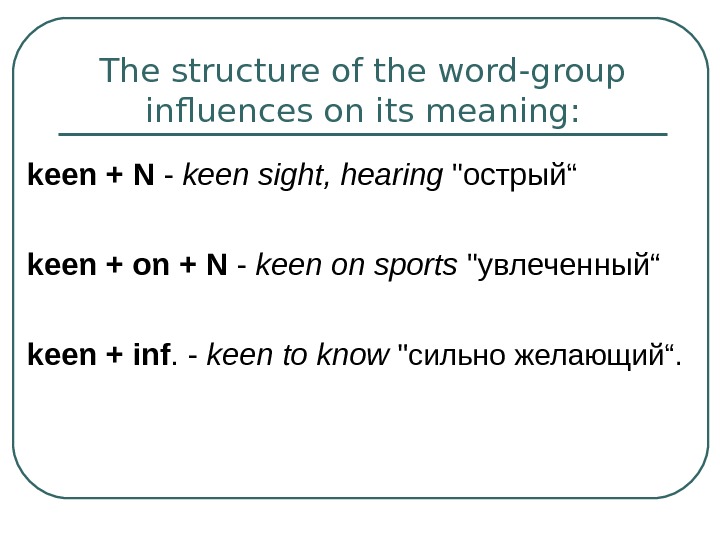
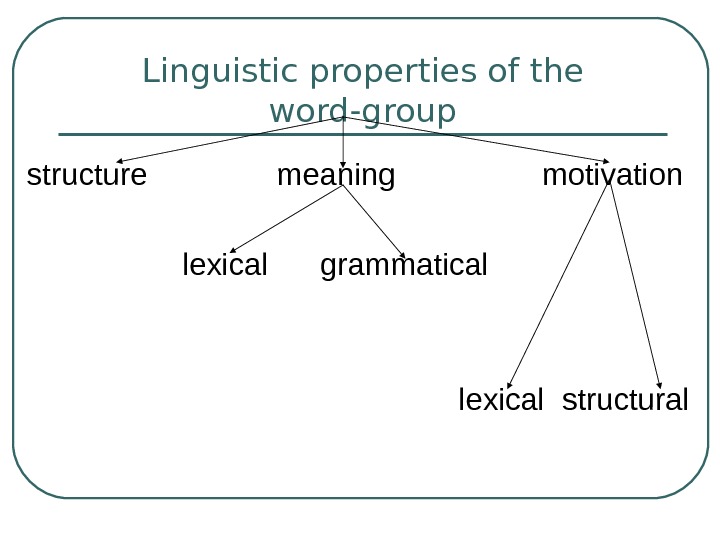
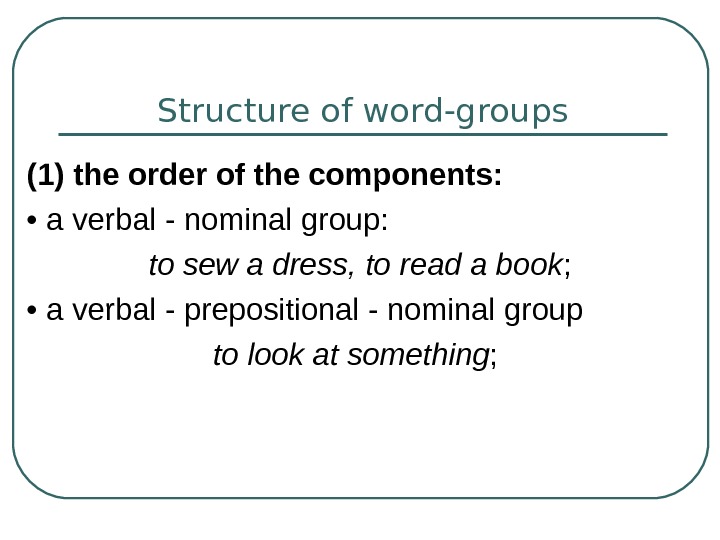
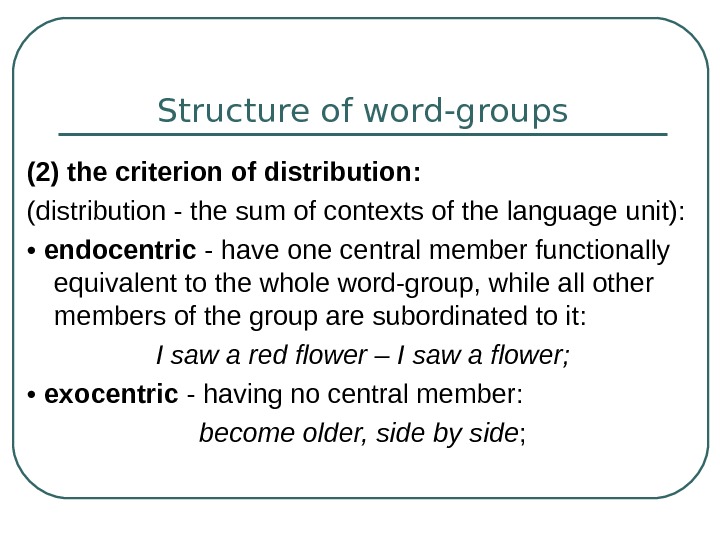
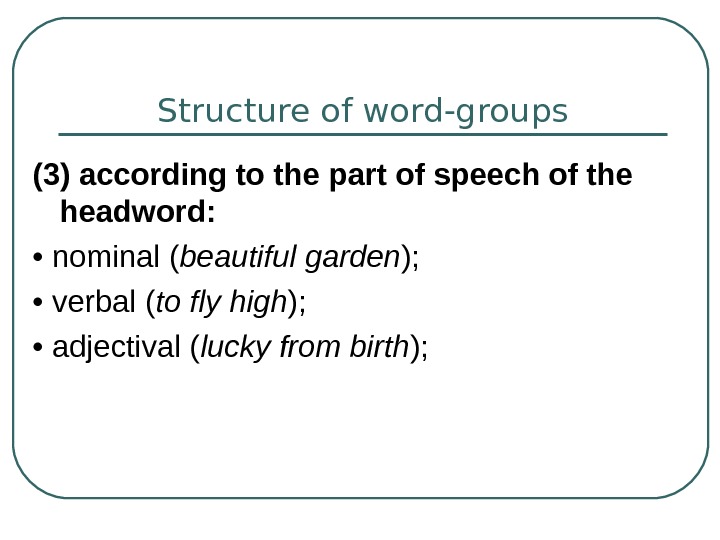
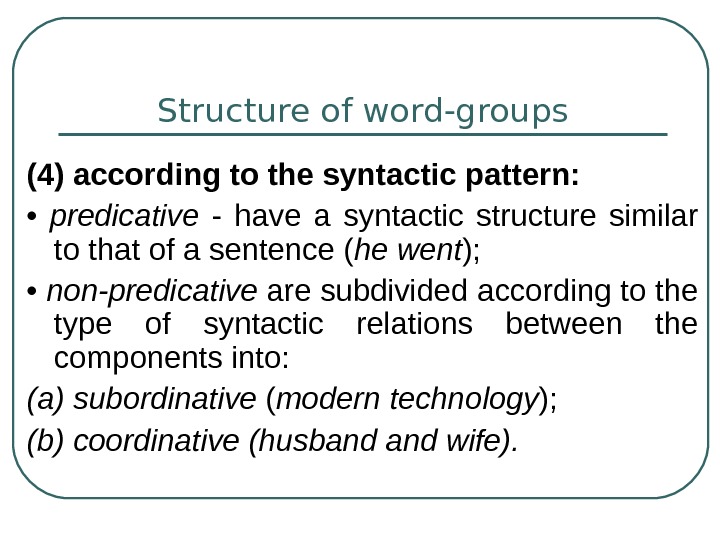

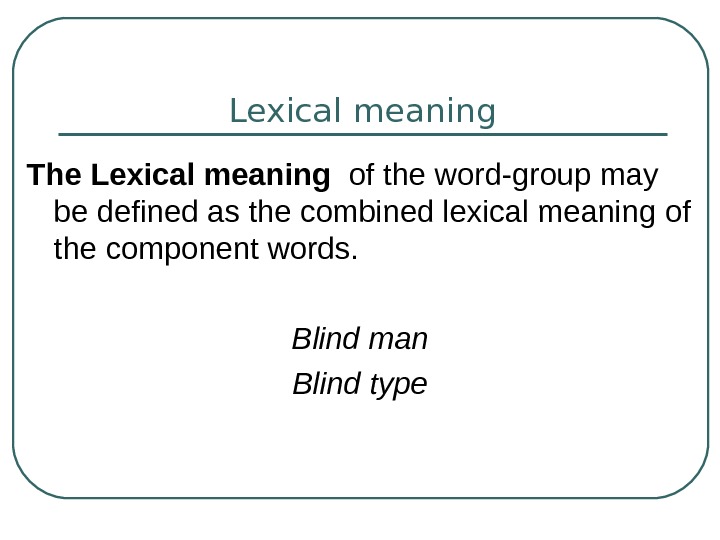
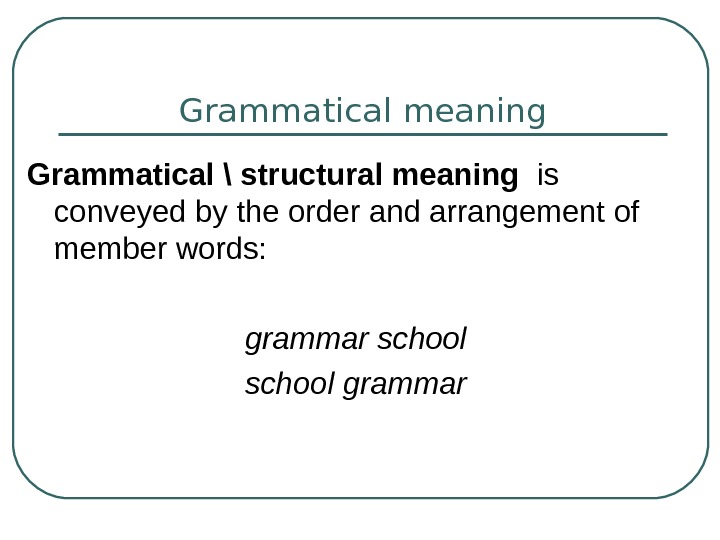
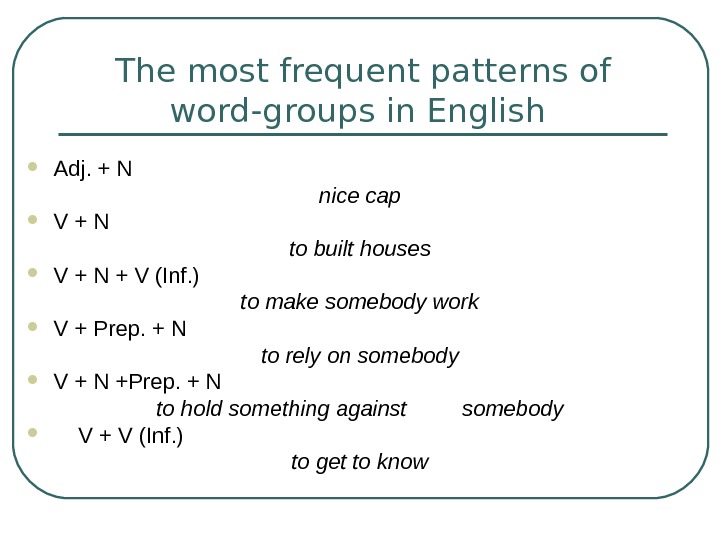
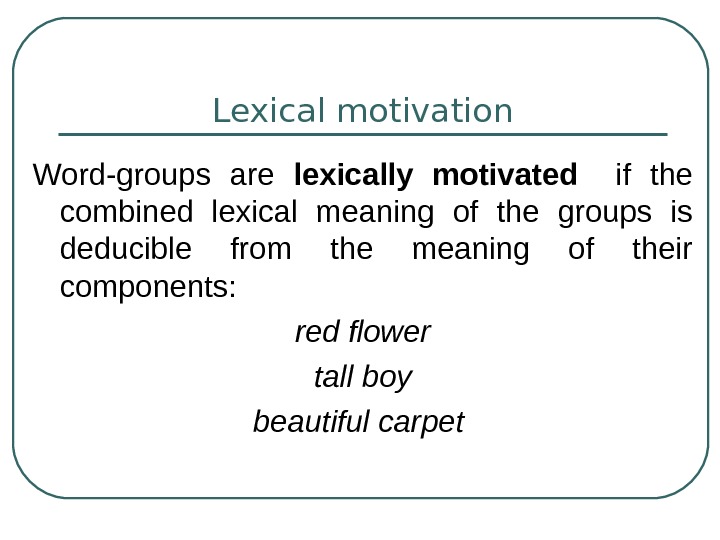
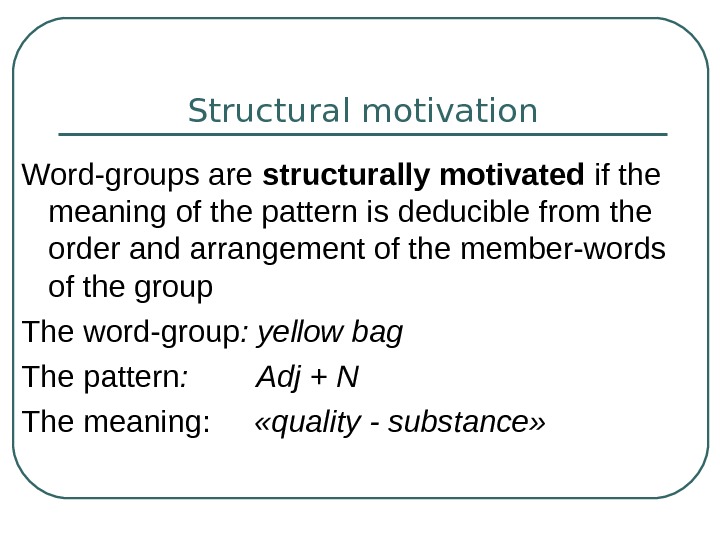
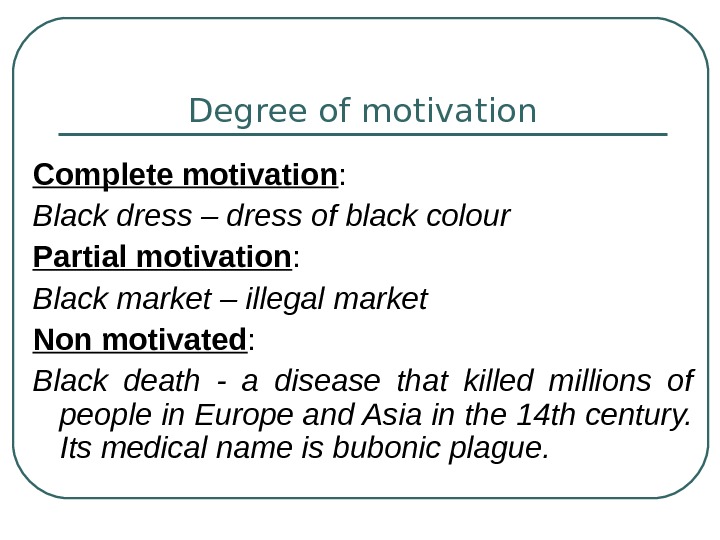
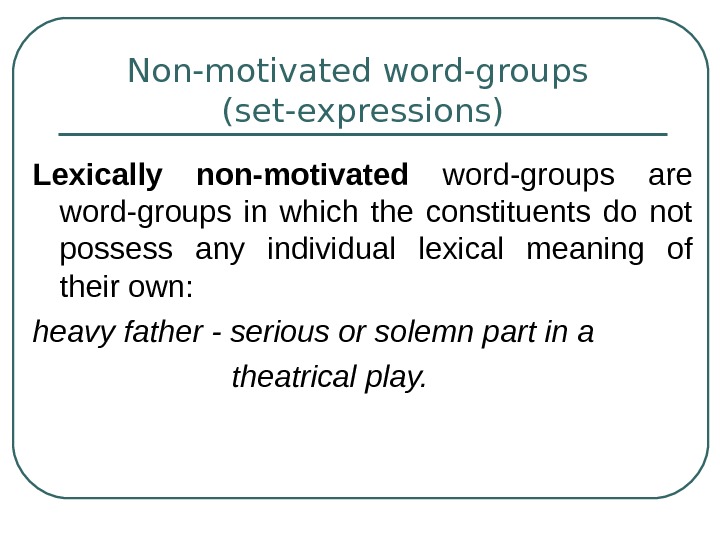
Скачать материал

Скачать материал




- Сейчас обучается 268 человек из 64 регионов




Описание презентации по отдельным слайдам:
-
1 слайд
Word Groups and Phraseological Units
Words put together to form lexical units make up phrases or word-groups.
-
2 слайд
The main factors active in bringing words together are lexical and grammatical valency of the components of word-groups.
-
3 слайд
Lexical valency is the aptness of a word to appear in various collocations.
All the words of the language possess a certain norm of lexical valency.
-
4 слайд
Grammatical valency is the aptness of a word to appear in various grammatical structures.
Restrictions of grammatical valency are to be accounted for by the grammatical structure of the language.
-
5 слайд
Semantically all word-groups may be classified into motivated and non-motivated. Non-motivated word-groups are usually described as phraseological units.
-
6 слайд
The same as words phraseological units express a single notion and are used in a sentence as one part of it.
American and British lexicographers call such units «idioms».
-
7 слайд
Phraseological Units
The border-line between free or variable word-groups and phraseological units is not clearly definedthe existing terms are: set-phrases, idioms, word-equivalents
-
8 слайд
Phraseological units are habitually defined as non-motivated word-groups that cannot be freely made up in speech but are reproduced as ready-made units
-
9 слайд
The main characteristic features of phraseological units are:
— stability of the lexical components
— lack of motivationCOMPARE: red flower and red tape
-
10 слайд
Phraseological units can be classified according to the ways they are formed, according to the degree of the motivation of their meaning, according to their structure and according to their part-of-speech meaning.
-
11 слайд
A.V. Koonin classified phraseological units according to the way they are formed.
He pointed out primary and secondary ways of forming phraseological units.
Primary ways of forming phraseological units are those when a unit is formed on the basis of a free word-group :
-
12 слайд
1) transferring the meaning of terminological word-groups:
«launching pad» in its terminological meaning is «стартовая площадка» , in its transferred meaning — «отправной пункт»,
«to link up» — «cтыковаться, стыковать космические корабли» in its tranformed meaning it means -«знакомиться»; -
13 слайд
2) from free word groups by transforming their meaning,
e.g. «granny farm» — «пансионат для престарелых»,
«Troyan horse» — «компьюторная программа, преднамеренно составленная для повреждения компьютера»; -
14 слайд
3) phraseological units can be formed by means of alliteration ,
e.g. «a sad sack» — «несчастный случай»,
«culture vulture» — «человек, интересующийся искусством»,
«fudge and nudge» — «уклончивость». -
15 слайд
4) they can be formed by means of distorting a word group,
e.g. «odds and ends» was formed from «odd ends», -
16 слайд
5) they can be formed when we use some unreal image,
e.g. «to have butterflies in the stomach» — «испытывать волнение»,
«to have green fingers» — »преуспевать как садовод-любитель -
17 слайд
Other ways:
when a phraseological unit is formed on the basis of another phraseological unit; they are:1) conversion, e.g. «to vote with one’s feet» was converted into «vote with one’s f eet»;
-
18 слайд
2) changing the grammar form, e.g. «Make hay while the sun shines» is transferred into a verbal phrase — «to make hay while the sun shines»
-
19 слайд
3)analogy,
e.g. «Curiosity killed the cat» was transferred into «Care killed the cat» -
20 слайд
4) contrast,
e.g. «cold surgery» — «a planned before operation» was formed by contrasting it with «acute surgery»,
«thin cat» — «a poor person» was formed by contrasting it with «fat cat»; -
21 слайд
6) shortening of proverbs or sayings
e.g. from the proverb «You can’t make a silk purse out of a sow’s ear» by means of clipping the middle of it the phraseological unit «to make a sow’s ear» was formed with the meaning «ошибаться -
22 слайд
7)borrowing phraseological units from other languages
e.g. « living space» (German), « to take the bull by the horns» ( Latin) -
23 слайд
Phraseological units sematically are classified according to V.V. Vinogradov :
-phraseological fusions (сращения) kick the bucket
phraseological unities (единства) e.g. the last straw, to ride the high horse
phraseological collocations (сочетания) e.g. to take smth for granted, to have a bite -
24 слайд
Structurally:
Verbal: to run for one’s life, to talk through one’s hat, to make a song and dance about smth.
Substantive: dog’s life, white lie, calf love.
Adjectival: high and mighty, brand new, safe and sound.
Adverbial: high and low, by hook or by crook
Interjectional: my God! Good Heavens!
Найдите материал к любому уроку, указав свой предмет (категорию), класс, учебник и тему:
6 210 144 материала в базе
- Выберите категорию:
- Выберите учебник и тему
-
Выберите класс:
-
Тип материала:
-
Все материалы
-
Статьи
-
Научные работы
-
Видеоуроки
-
Презентации
-
Конспекты
-
Тесты
-
Рабочие программы
-
Другие методич. материалы
-
Найти материалы
Другие материалы
- 27.12.2020
- 4749
- 2
- 27.12.2020
- 4947
- 11
- 27.12.2020
- 5785
- 13
- 27.12.2020
- 5022
- 9
- 27.12.2020
- 4057
- 1
- 27.12.2020
- 3882
- 0
- 27.12.2020
- 3905
- 1
- 27.12.2020
- 3300
- 4
Вам будут интересны эти курсы:
-
Курс повышения квалификации «Основы туризма и гостеприимства»
-
Курс повышения квалификации «Организация практики студентов в соответствии с требованиями ФГОС юридических направлений подготовки»
-
Курс профессиональной переподготовки «Организация деятельности помощника-референта руководителя со знанием иностранных языков»
-
Курс профессиональной переподготовки «Корпоративная культура как фактор эффективности современной организации»
-
Курс повышения квалификации «Актуальные вопросы банковской деятельности»
-
Курс профессиональной переподготовки «Уголовно-правовые дисциплины: теория и методика преподавания в образовательной организации»
-
Курс профессиональной переподготовки «Методика организации, руководства и координации музейной деятельности»
-
Курс профессиональной переподготовки «Гостиничный менеджмент: организация управления текущей деятельностью»
-
Курс профессиональной переподготовки «Технический контроль и техническая подготовка сварочного процесса»
-
Курс профессиональной переподготовки «Информационная поддержка бизнес-процессов в организации»























